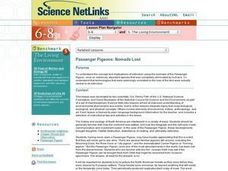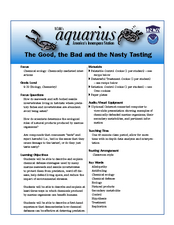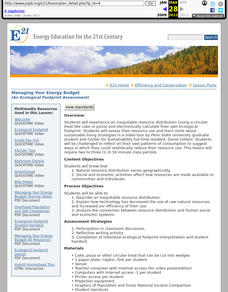Curated OER
PASSENGER PIGEONS: NOMADS LOST
Middle schoolers explore the concept and implications of extinction using the example of the Passenger Pigeon, once an extremely abundant species that was completely eliminated by humans.
Curated OER
Wetland Metaphors
Learners describe the characteristics of wetlands and identify their ecological functions. They inspect items and use them to create metaphors about wetlands.
Chicago Botanic Garden
Introducing Ecosystem Services
Ecosystems provide many things humans not only use but also need in order to survive. The last instructional activity in the series of seven introduces scholars to the idea of ecosystem services, that ecosystems provide humans with many...
Curated OER
Revised: Adventures in Earth Day: Why Do We Care About Our Environment? - Biology Teaching Thesis
To describe the ecological and aesthetic importance of the Potomac River, Middle schoolers name the ways in which the river's values are jeopardized and explain the purpose of Earth Day. They write a response to a newspaper article in a...
Serendip
Changing Biological Communities – Disturbance and Succession
After cutting down a forest to make a farm, how long would it take the environment to turn an abandoned farm back into a forest? Scholars study this exact scenario while they interpret many charts and graphs of the changing ecosystems as...
Curated OER
The Web of Life
Students demonstrate the interrelationships of animals and plants. In this ecology lesson, students discuss the things plants and animals need for survival and study the glacier food chain. Students simulate the web of life by using a...
Curated OER
That's Predictable - Stream Side Science
Research the impact that changes in biotic or abiotic factors might have on an ecosystem. Debate for or against the changes and take action in the community. This resource ideally follows stream studies that young ecologists may have...
It's About Time
The Water Cycle
Explore the water cycle with a hands-on earth science activity that prompts pupils to measure the amount of water normally transpired by plants. After they describe the flow of the water cycle and provide examples of how human activities...
It's About Time
Photosynthesis, Respiration, and the Carbon Cycle
Provide your class with the opportunity to view our carbon cycle close up. Young scientists research the cycle of oxygen as it completes the tasks of photosynthesis and respiration. They explore the importance of carbon in an ecosystem...
It's About Time
Factors Affecting Population Size
How do we predict future population growth? Young researchers investigate various factors affecting the size of our population. As they calculate and interpret graphs to determine factors that could potentially affect increases and...
It's About Time
Diversity in Living Things
How diverse is the world we live in compared to the way things used to be? Young biologists explore diverse organisms and relate the structure of each organism to its ability to survive in our current environmental conditions....
Curated OER
Design a Reef!
Using a miniature coral reef aquarium kit, young ecologists model this unique ecosystem. They research various coral reef organisms and their niches, and they culminate the project by working together to write a report. Use this activity...
Curated OER
Listening To The Prairie
Students investigate the concept of agriculture and how it is part of the ecology and economy of the United States. They participate in a number of different classroom activities intended to raise agricultural awareness. The activities...
Curated OER
The Ghost of Populations Past
Students study population distribution and survivorship curves by collecting data regarding age of death of humans from either tombstones, newspapers, or other community resources. Students analyze data by creating graphs and population...
Curated OER
Deforestation
Learners identify the different tropical rainforests in the world using a map. In this ecology instructional activity, students describe the different methods of deforestation. They create a memo and present it to class.
Curated OER
The Aral Sea: A Time for Change
Ninth graders investigate the physical changes in the Aral Sea from the year of 1960. They conduct research to find information. Students compare and contrast the changes caused by human activity over the years. They create their own...
Curated OER
The Good, the Bad and the Nasty Tasting
Students examine the effect of chemicals from marine plants or animals on predator's preferences. In this ecology lesson, students conduct taste tests and collect necessary data. They write their conclusion after analyzing experimental...
Curated OER
Managing Your Energy Budget
Students experience an inequitable resource distribution and electronically calculate their own Ecological Footprint. The assess their resource use and learn more about sustainable living strategies in a video tour by Penn State...
Curated OER
Michigan's Lumbering history: Yesterday, Today, and Tomorrow
Fourth graders explore lumbering in Michigan. For this lumbering lesson, 4th graders examine the life of a modern day lumberjack and how technology can interfere with natural ecology. Students create a list of products from the forest...
Curated OER
Coral Reefs Endangered
Pupils research where in the world coral reefs are located. In this ecology lesson, students create food chains and food web. They simulate growing coral reefs to understand their characteristics better.
Curated OER
Water Quality
Students play the role of scientists testing for water quality in the area. In this ecology lesson, students determine the water sample's pH, temperature, dissolved oxygen and turbidity. They write a journal reflection after the activity.
Curated OER
Are You Thirsty: The Effects of Pollution on Drinking Water
Middle schoolers discuss the different causes of water pollution. In this ecology lesson, students brainstorm ways to purify polluted water. They formulate their conclusion based on the results of the experiments.
Curated OER
Michigan Ecosystems: The Web They Weave
Students examine the forest ecosystem and how all life in the forest depends upon itself. In this ecological instructional activity, students participate in a personal connections activity where someone pulls on a string and everyone...
Curated OER
Nature and Fintess Trail
Students investigate how humans impact the environment and compile an organism database into an e-book field guide. They name muscle groups and develop specific exercises to strengthen these groups. Students utilize technology for data...

























